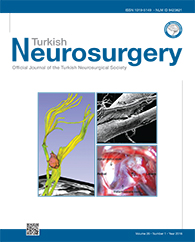2Reyap Hospital, Department of Neurosurgery, Tekirdağ, Turkey
3Kocaeli University, Center for Stem Cell and Gene Therapies Research and Practice, Institute of Health Sciences, Department of Stem Cell, Izmit-Kocaeli, Turkey
4Liv Hospital, Center for Regenerative Medicine and Stem Cell Research & Manufacturing (LivMedCell), Istanbul, Turkey
5Istanbul Aydin University, Faculty of Health Sciences, Istanbul, Turkey DOI : 10.5137/1019-5149.JTN.15724-15.0 AIM: To investigate the effectiveness of rat adipose tissue-derived (rAT) mesenchymal stem cell (MSC) transplantation on the functional restoration and regeneration of spinal cord injury (SCI).
MATERIAL and METHODS: Six of 48 Wistar albino rats were sacrificed to obtain MSCs, and the remaining rats were divided randomly into six groups. SCI was performed using the clip compression method. The control and transplantation groups were injected with physiological saline and a rAT-MSC suspension at the injury sites, respectively. Each animal was evaluated using the Basso, Beattie and Bresnahan (BBB) rating system and sacrificed at 28 days post-injury period (p.i.). The regeneration process was evaluated based on immunostaining against β3-tubulin, BDNF, CNTF, and CNPase.
RESULTS: rAT-MSC transplantation into the SCI site substantially improved the tissue regeneration and functional recovery (p < 0.05). However, the rAT-MSC transplantation at 9 days p.i. was not more efficient on functional recovery than the transplantation immediately after injury. The expression of β3-tubulin, BDNF and CNTF at the injury site indicated the potential for functional regeneration.
CONCLUSION: The adaptive nature of rat-MSCs enabled the remodulation and regeneration of the lesion site, decreasing the importance of transplantation time in the treatment of SCI.
Keywords : Adipose tissue, Mesenchymal Stem cells, Spinal cord injury, Transplantation




